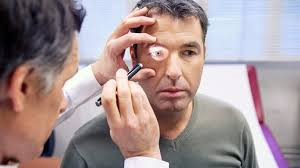When discussing health issues, the importance of caring for your eyes is often overlooked. While you may have no apparent vision problems, an eye exam can help your doctor spot early warning signs of eye disease. August is National Eye Exam Month, so now is the perfect time to make an appointment.
 Vision should be checked every two to four years for ages 40 to 65 and every one to two years for those 65+. If you have a family history of eye disease or a chronic illness, you may need to have your eyes checked more often.
Vision should be checked every two to four years for ages 40 to 65 and every one to two years for those 65+. If you have a family history of eye disease or a chronic illness, you may need to have your eyes checked more often.
As we age, our vision changes, but vision loss is not a normal part of aging. Age-related eye diseases can lead to vision loss and many do not have obvious symptoms, so it is important to let your eye care professional know if your family has a history of eye disease. To detect cataracts, glaucoma, diabetic retinopathy, age-related macular degeneration and other vision issues, an ophthalmologist or optometrist can do a comprehensive dilated eye exam. This exam is different from the exam for glasses or contacts.
Medicare helps to pay for comprehensive dilated eye exams for people with diabetes and those at higher risk for glaucoma. To learn more, contact 1-800-MEDICARE or visit the Medicare website.
The National Eye Institute provides the following tips for protecting your vision at any age:
- Stop smoking.
- Eat a diet rich in green leafy vegetables and fish.
- Be physically active every day.
- Maintain normal blood pressure.
- Control diabetes if you have it.
- Wear sunglasses and a brimmed hat.
- Wear protective eye wear.
Talk to your eye care professional for more information on how to care for your eyes and to schedule an exam. Eye health can play an important part in your quality of life.





